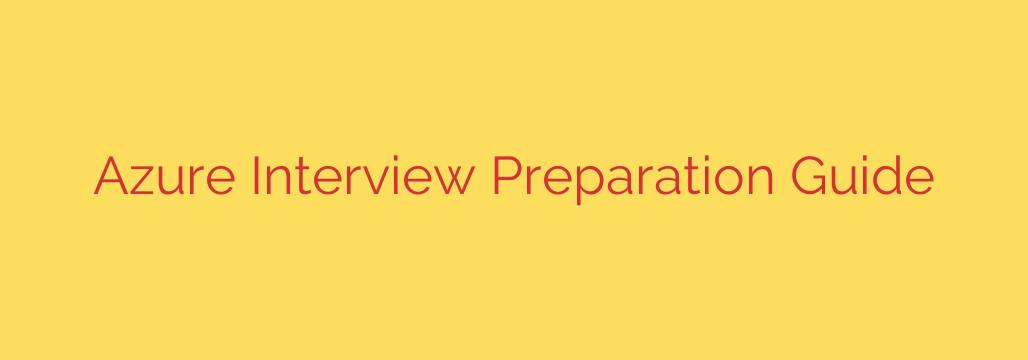
Preparing for an interview centered around Microsoft Azure requires a focused and comprehensive approach. Success hinges on demonstrating not just theoretical knowledge but also practical understanding and problem-solving skills within the cloud environment. To truly excel, one must delve deep into core cloud concepts and their specific implementation within Azure.
A strong foundation in fundamental Azure services is non-negotiable. This includes a solid grasp of Azure Compute options like Virtual Machines (VMs), App Services, Functions, and Kubernetes Service (AKS). Understanding when and why to choose a particular compute model is crucial. Equally important is proficiency in Azure Storage, covering Blob Storage, File Storage, Queue Storage, and Disk Storage, along with associated access tiers and redundancy options.
Azure Networking is another critical domain. Candidates must be comfortable discussing Virtual Networks (VNets), subnets, Network Security Groups (NSGs), Load Balancers, Application Gateways, and connectivity options like VPN Gateways and ExpressRoute. Knowledge of network security principles within Azure is paramount.
Security is a pervasive theme in cloud roles. Expect questions on Azure Identity and Access Management (IAM), focusing on Azure Active Directory (Azure AD) (now Microsoft Entra ID) and Role-Based Access Control (RBAC). Understanding Azure Security Center (now Microsoft Defender for Cloud), key vaults, and data encryption methods is also vital.
Databases are central to many applications. Familiarity with Azure Database services, including Azure SQL Database, Azure Database for MySQL/PostgreSQL/MariaDB, and NoSQL options like Cosmos DB, is highly valuable. Discussing managed services and scaling strategies will showcase depth.
Beyond core infrastructure, knowledge of management and monitoring tools like Azure Monitor, Application Insights, and Log Analytics is essential for demonstrating operational readiness. Increasingly, understanding Infrastructure as Code (IaC) using tools like ARM templates, Bicep, or Terraform, and principles of Azure DevOps for continuous integration and continuous delivery (CI/CD) pipelines, is expected.
Interview questions often go beyond simple definitions. Be prepared for scenario-based questions where you’ll need to design solutions, optimize costs, or troubleshoot issues based on realistic cloud scenarios. Practical experience gained through hands-on labs, personal projects, or work experience deploying and managing resources in Azure is invaluable for tackling these questions effectively. Discussing your experience with troubleshooting common Azure problems will also score points.
Preparation should involve reviewing the official Azure documentation, practicing configurations, and attempting mock interviews to simulate the pressure and question types. Highlighting relevant certifications can validate your expertise, but they are typically seen as a complement to practical skills, not a replacement. Emphasize understanding best practices for cost optimization, security, performance, and high availability. Staying updated with the latest Azure service announcements and features demonstrates a commitment to the platform.
By focusing on these key areas – core services, practical application, security, operational tools, and scenario handling – and articulating your experience clearly, you can present yourself as a highly capable candidate ready to tackle the challenges of a modern cloud role.
Source: https://www.simplilearn.com/azure-interview-guide-pdf








